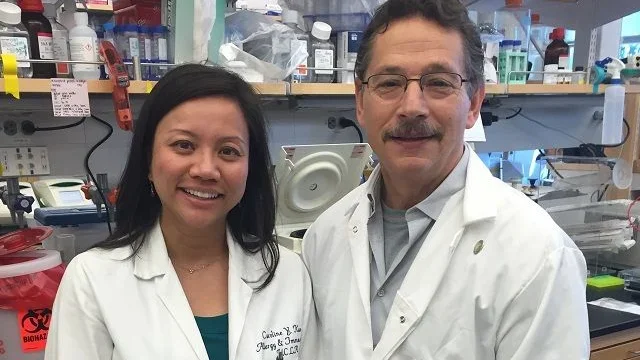Immunodeficiency and Immune Dysregulation

Rare immune diseases are also known as Primary Immunodeficiency Diseases (PID) and Primary Immunodysregulatory Diseases (PIRD). These disorders manifest in children and adults with symptoms and signs of increased susceptibility to infections (severe infections, unusual infections, repeated infections), autoimmunity, and auto-inflammation (fevers, rashes, inflammation).
By elucidating the underlying cause of rare immune diseases, we learn more about the human immune system. Furthermore, we improve our ability to apply rational treatments.
Genome/Exome Sequencing
The revolutions in genomic and information technologies provide unprecedented opportunities to advance the diagnosis and treatment of diseases. Our clinic utilizes state-of-the-art technologies including clinical genome or exome sequencing to diagnose rare disorders. For more information, please refer to the following page on Clinical Exome Sequencing.
Gene Therapy
Blood stem cell gene therapy method collects some of a patient’s own blood stem cells and either adds a good copy of the defective gene or fixes the broken genes to eliminate disease-causing mutations. The patient then receives a transplant of their own corrected stem cells, which will ideally create an ongoing supply of healthy blood cells. Importantly, this method eliminates the risk of rejection associated with receiving a bone marrow transplant from a different person, meaning the patient doesn’t have to take a lifelong supply of anti-rejection drugs.

Dr. Donald Kohn and Dr. Caroline Kuo’s clinical trials for adenosine deaminase-deficient severe combined immunodeficiency (also known as ADA-SCID or bubble baby disease), a condition where babies are born without an immune system and often don’t survive past the first two years of life, have cured more than 50 babies to date. Babies with the condition and their families have traveled to UCLA for this life-saving treatment from as far away as Lebanon and a new company was formed in 2016 to further develop the therapy and make it available at other centers and to more patients.
Similar blood stem cell gene therapy techniques in clinical trials for other diseases are currently being conducted. One of these diseases is X-linked chronic granulomatous disease, a rare inherited immunodeficiency disorder that prevents white blood cells from effectively killing foreign invaders such as bacteria, fungi or other microorganisms. If untreated, patients often succumb to chronic granulomatous disease within the first decades of life.
Interested in Research?
Please look through the following studies to see if your interested in being apart of research in Immunology. Please contact Alexis Stephens at (310) 210-8771 if you would like to participate in any of the following. If you are interested in other clinical trials for Immunodeficiency at other UC Health websites then please use the following link.
Covid Genetics
The purpose of this research study is to identify the genes that cause predisposition to infection with Severe acute respiratory syndrome coronavirus 2 (SARS-CoV-2).
Immune Disorders
The purpose of this study is to identify the genes, molecules, pathways and cells that contribute to immune diseases.
Disseminated Coccidioidomycosis
We have assembled a team of immunologists, geneticists, and infection experts from UCLA, UCSD, and UCSF, and have partnered with the Valley Fever Institute (VFI), to collect samples and surveys from individuals infected with DCM (disseminated coccidioidomycosis) and uncomplicated Valley Fever (UVF). Understanding the immunological dysfunction that underlies a susceptibility to Disseminated Coccidodiomycosis will allow us to predict who will have mild or grave consequences of Cocci infection. Our goal is to apply this knowledge to develop new treatments.
Genetic Risk Factors in Pediatric Lupus
The purpose of this research is to identify genes that may indicate that a person has an increased risk of getting lupus. This study will enhance our knowledge of SLE biomarkers, disease progression, and the genes that are involved in the development of SLE.
CVID
This is an observational, case-control study with a single blood draw among two cohorts, patients with antibody deficiency (e.g., CVID) and healthy controls. Samples will be analyzed by mass cytometry (CyTOF) to examine the major signaling pathways of all circulating innate and adaptive immune cell types, as well as whole exome sequencing. The goal is to improve our general understanding of the human immune response to infections and the diagnosis of CVID.
Dupilumab in Peanut Allergy
Double-Blind, Placebo‑Controlled Study in Pediatric Subjects with Peanut Allergy to Evaluate the Efficacy and Safety of Dupilumab as Adjunct to AR101 (Peanut Oral Immunotherapy). The main purpose of this study is to determine if dupilumab is safe and if it works to improve the desensitization to peanuts when taken in combination with AR101( investigational oral immunotherapy that contains peanut allergen).
Peanut Patch Study for Children Ages 1-3
A double-blind, placebo-controlled, randomized phase III trial to assess the safety and efficacy of Viaskin® Peanut in peanut-allergic young children 1-3 years of age (EPITOPE study)
Childhood Arthritis and Rheumatology Research Alliance (CARRA)
The CARRA Registry collects information about children with pediatric rheumatic diseases. Each child will be followed for at least 10 years. This information is securely stored in a database without any information that could identify the child. Researchers study the stored information to better understand pediatric rheumatic diseases, see how children do over the long term, and better understand the safety of the treatments they receive. The Registry also helps find children who may be eligible for other studies.
ADA SCID
Leadiant Biosciences, Inc. (the Sponsor) is conducting an observational study on Revcovi™. The purpose of this study is to collect information on patients with ADA- SCID receiving Revcovi™.
Chronic Nonbacterial Osteomyelitis (CNO)
The objective of the study is to establish a prospective disease registry for chronic recurrent multifocal osteomyelitis (CRMO)/chronic nonbacterial osteomyelitis (CNO) in order to
investigate the natural history of the disease and the responses of patients to different clinical managements over 5 years.
Allergy Database
The purpose of this study is to create a database of people with allergic and immune problems so that they may be contacted about participation in future research studies. The goal is to have some clinical information and contact information about the children and
adults with allergies and immune problems that come to our Allergy & Immunology Clinics. This information will be stored in a database which can then be used by Researchers in Allergy and Immunology at UCLA to identify potential participants in various research studies.
Neuroinflammatory Disease
We have recently recognized that inflammation of the brain – especially of the brain blood vessels (vasculitis) – is a common cause of such brain damage in previously healthy children.
Inflammation can be treated so some children can potentially make a full recovery. In order to achieve this, we must first better understand these diseases. A research study called BrainWorks will allow us to learn more about these diseases.
Eligibility
The Jeffrey Modell Foundation Diagnostic Center for Primary Immunodeficiency Diseases at UCLA
The Jeffrey Modell Foundation supports 35 diagnostic and research centers worldwide, each dedicated to improving the lives of individuals with primary immunodeficiency (ID) disease. UCLA is home to Southern California’s only Jeffrey Modell Foundation Diagnostic Center.
Primary ID is a new area of investigation. While some conditions are well characterized, new immunodeficiencies are described each year. The Modell Center at UCLA is unique in that it offers diagnostic evaluation for patients with these newly described immunodeficiencies.
The following procedures on the right are how you can be seen by Dr. Manish Butte or another Immunologist. Please refer to the number below for more questions about appointments and referrals.
Contact Us
Appointments & Referrals: (310) 825-0867
Administrative Office: (310) 825-9832